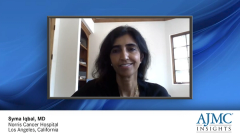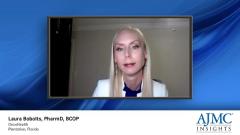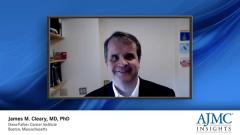
Evolving Treatment Landscape for Upper GI and Esophageal Cancer
Evolving treatment strategies for esophagogastric cancer are explored by Syma Iqbal, MD, including unmet needs across the treatment landscape.
Episodes in this series

Syma Iqbal, MD: The treatment landscape for esophageal and gastric cancers has changed significantly over the last few years. That has largely been due to the incorporation of immunotherapy in both the metastatic setting and the adjuvant setting. Our paradigm of treatment now incorporates frontline immunotherapy in the large majority of our patients, whether they’re HER2-positive or HER2-negative. For esophageal or GE [gastroesophageal] junction cancer, immunotherapy is incorporated into adjuvant treatment of these patients after trimodality therapy, which includes chemotherapy, radiation, and surgery.
The clinical burden in esophageal cancer is less common than gastric cancer. Although adenocarcinoma is increasing in incidence, squamous cell carcinoma is decreasing in incidence. In the United States, there are about 20,000 new diagnoses per year. In gastric cancer, there are about 26,000 new diagnoses per year. The incidence of gastric cancer is decreasing in the Western world.
What becomes significant in treating patients with esophagogastric cancer are their comorbidities, because patients with esophageal cancers, particularly squamous cell carcinoma, more commonly tend to smoke or have alcohol use, and as such could have other associated risk factors. These patients tend to present with poor performance status, particularly patients with squamous cell carcinoma.
For adenocarcinoma of the stomach or esophagus, there aren’t necessarily any significant comorbidities that we need to worry about as we do in the squamous cell population. Unfortunately, because most patients tend to present with advanced disease, the performance status of the patient is always an important evaluation as we make treatment decisions.
In particular with esophagogastric cancers, unfortunately, although it’s a small percentage of the population that presents with this disease, this disease tends to be aggressive. Despite the advances we have made over the last several years in esophagogastric cancer, and in particular over the last few years with the incorporation of immunotherapy, the outcome for these patients remains poor whether they have localized or advanced disease. There is still a lot of opportunity for improvement in therapy, and as such, there are ongoing trials evaluating other nonimmunotherapy agents to see if we can improve the outcome for these patients. There is also a consideration in the adjuvant setting in terms of the potentially curable patient. We still aren’t achieving cures in the majority of our patients when we think about all comers, so there’s still a lot of opportunity for improvement.
Transcript edited for clarity.
Newsletter
Stay ahead of policy, cost, and value—subscribe to AJMC for expert insights at the intersection of clinical care and health economics.












